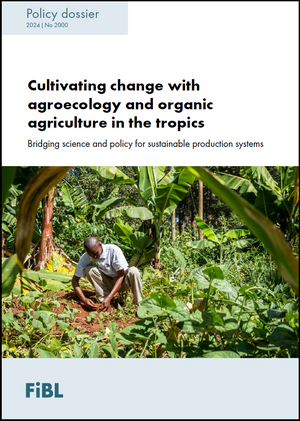Cultivating change with agroecology and organic agriculture in the tropics:
Bridging science and policy for sustainable production systems
Despite technological advancements in food systems since the green revolution, current food systems are failing to meet the needs of both society and the environment. Nowhere are the challenges and hidden costs of "business as usual" food systems more evident than in the tropics, where disproportionate food insecurity, malnutrition, and impacts of climate change pose significant threats. These obstacles are expected to escalate into the future due to climate change, demographic shifts, political instability, conflicts, and increased demands on natural resources. To address these issues, it is crucial to explore promising alternative approaches for achieving the Sustainable Development Goals. FiBL’s policy dossier, based on 88 scientific publications, demonstrates that these approaches can contribute to a transformation of production systems in the tropics. The publication illustrates that agroecology and organic systems:
- show promise in achieving yields that are on par with conventional;
- can improve household income and livelihood resilience compared to conventional, especially in diverse systems and with price premiums;
- help lower negative externalities and costs to the public, which will be increasingly important as climate change impacts worsen;
- positively contribute to both climate adaptation and mitigation via smaller carbon footprints and increased carbon storage, helping farms better adapt to climate change;
- help combat the biodiversity crisis, improve soil health and water quality and encourage the adoption of crop-livestock systems;
- help improve food security and nutritional outcomes and reduce exposure to harmful pesticides.
Although the evidence in favour of agroecology and organic is quite compelling, their full benefits cannot be realised in most countries due to political and institutional barriers and lock-ins. Overcoming present and future challenges will require educated and empowered decision-makers, policymakers and experts involved in international cooperation who support and develop strategies for transitioning to agroecology and organic. The policy dossier is aimed at these stakeholders and offers 11 opportunities for change, with the goal of connecting scientific insights with practical implementation.

 tap and then scroll down to the Add to Home Screen command.
tap and then scroll down to the Add to Home Screen command.